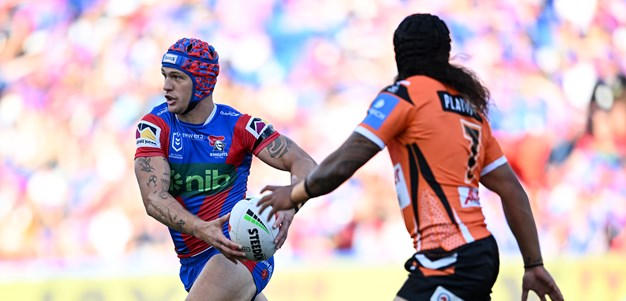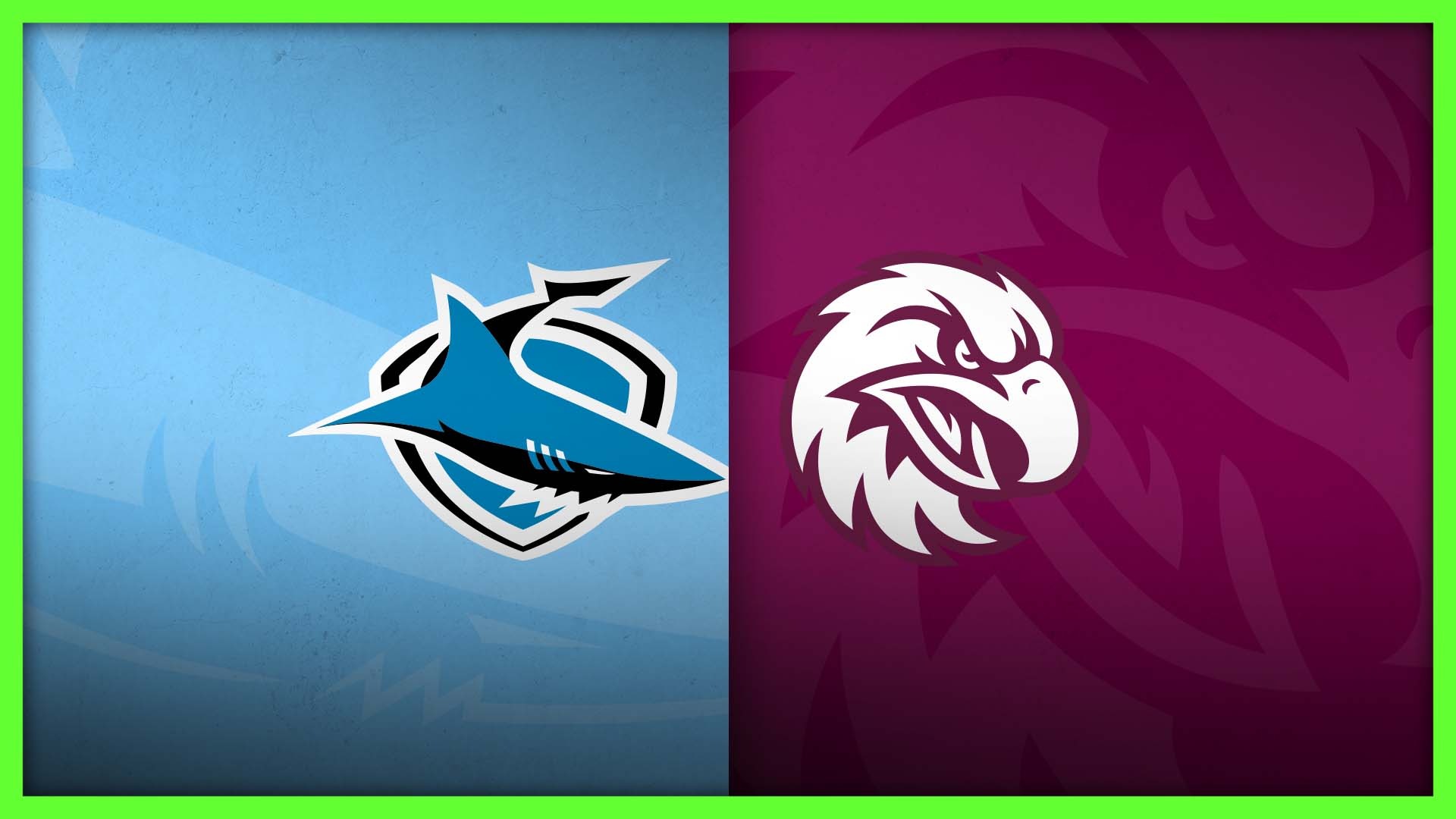IRL deputy chairman Troy Grant has welcomed proposed changes to State of Origin eligibility rules that could enable Jason Taumalolo to pull on a Maroons jersey and Tongan enforcer Addin Fonua-Blake to play for NSW while reviving hopes of Kalyn Ponga representing New Zealand.
ARL commissioner and NRL innovation committee chair Wayne Pearce, who is also a member of the IRL board, is conducting a review of the Origin selection criteria to ensure the best eligible players continue to be available for the Blues and Maroons.
Such a move, which would not be introduced until after the end-of-season World Cup, is also likely to boost the international game as players with dual eligibility may no longer be forced to choose between State of Origin and representing their country of birth or heritage.
With 71% of NRL players born outside Australia or having parents or grandparents who were, including 52% of Pacific nations heritage, many struggle with representative decisions.
The international calendar beyond the World Cup is expected to remove the mid-season clash between Origin and Tests involving Pacific nations so players who qualify are free to play both – a move expected to please NRL clubs who would prefer internationals at the end of the year.
It looks like you may be using adblocking software to view this site.
Many features on the site, such as video playback, may not work properly when using adblocking software.
Please whitelist our domain or disable your adblocker to access all features and videos.
Renouf has his say on Taumalolo's Origin eligibility
Any changes to the Origin selection criteria would not open the floodgates for the likes of Canberra hooker Josh Hodgson (England) or Cronulla playmaker Shaun Johnson (New Zealand) to get a start as players must reside in NSW or Queensland before the age of 13 to be eligible.
However, by removing the requirement that players must be available for Australia to be considered for Origin selection the likes of Fonua-Blake, Taumalolo, Dallin Watene-Zelezniak, Brandon Smith, Jahrome Hughes and Briton Nikora could put their hands up for Blues or Maroons selection.
All were born in Australia or moved from New Zealand at a young age so qualify for Origin but are currently ineligible as they have played for the Kiwis.
There would be no impact on international eligibility as the Origin selection criteria is a domestic Australia policy which had been aimed at ensuring the strength of the concept but is now sidelining a growing number of players who want to represent their heritage.
There are only a handful of current Kiwi internationals affected but Ponga may be able to represent New Zealand, where he first played league at the age of eight and has family ties, without jeopardising his eligibility for Queensland.
Taumalolo also wants to play for Queensland and new Maroons coach Paul Green is keen to select him but the Tonga superstar is ineligible as he represented New Zealand in 10 Tests before switching allegiances at the 2017 World Cup.
The Cowboys lock moved to Queensland before his 13th birthday and would already be an Origin star if he hadn’t decided in 2014 to play for New Zealand, where he was born to Tongan parents.
It looks like you may be using adblocking software to view this site.
Many features on the site, such as video playback, may not work properly when using adblocking software.
Please whitelist our domain or disable your adblocker to access all features and videos.
Broncos relocate from Brisbane after COVID-19 lockdown
Fonua-Blake was born and raised in Sydney, where he began his junior football with Mascot, but the Warriors prop played for the Kiwis at the 2017 World Cup before joining the Tongan revolution inspired by Taumalolo and Andrew Fifita the following season.
Dual eligibility 'elevates international rugby league'
Grant, who is a member of the NRL innovation committee as well as being the IRL’s deputy chairman, said enabling eligible players to play Origin and represent nations other than Australia would benefit the international game.
The former NSW Deputy Premier pointed out the issue of dual eligibility had also occurred in Australian parliament after 15 elected politicians had to relinquish their seats in 2017 because they also held citizenship of another country.
“State of Origin is one of rugby league’s showpiece events that showcases the very best rugby league has to offer and both states should be rightly proud of the product," Grant said.
It looks like you may be using adblocking software to view this site.
Many features on the site, such as video playback, may not work properly when using adblocking software.
Please whitelist our domain or disable your adblocker to access all features and videos.
ARLC to consider RLPA proposal after injuries hit Round 3
“It only elevates rugby league internationally and who qualifies for the Maroons and the Blues is clearly a matter for the ARLC, QRL and NSWRL.
“Regarding any participation in State of Origin and then eligibility for international representation, our rules are pretty clear with players required to nominate their nationality at the beginning of a season, which requires them to maintain that representation continuity for a period of time.
“The reality is that Australia is a multi-cultural country and dual eligibility was a common thing that was even seen in our nation’s parliament.
"Any player who gets to play State of Origin and then represent a country other than Australia would only bring an enhancement to the international game, in my belief.
“It’s important that the credibility of State of Origin and its reputation remains solid and the doors aren’t just flung open. It is equally important that international eligibility maintains its credibility too. I think both can be achieved."
Chance to build on Pacific presence in Origin
Under international eligibility rules, players must nominate which country they want to represent but those with dual eligibility are able to select a tier-one nation – Australia, New Zealand and England – and if not selected can then play for a tier-two nation, if eligible.
Players cannot represent two nations in the same year and are unable to switch between tier-one nations, meaning Taumalolo or Fonua-Blake would never be able to play for Australia.
It looks like you may be using adblocking software to view this site.
Many features on the site, such as video playback, may not work properly when using adblocking software.
Please whitelist our domain or disable your adblocker to access all features and videos.
Robinson urges fans to support Masoe
Pacific Island players have regularly featured in Origin, with Daniel Tupou (Tonga), Junior Paulo (Samoa) and Daniel Saifiti (Fiji) in last year’s NSW squad and Xavier Coates (PNG), Brenko Lee (Tonga) and Tino Fa'asuamaleaui (Samoa) representing Queensland.
There were no international games last season because of the COVID-19 pandemic and a number of those players made it clear they would choose their country of heritage if forced to decide.
If only players from tier two nations with dual eligibility could represent NSW or Queensland there are fears that New Zealand would be disadvantaged as Kiwis who also qualify for a Pacific nation would be likely to take that option so they could play Origin.
South Sydney prop Tevita Tatola, who has played two Tests for Tonga, is born in Sydney and would also like to represent NSW.
It looks like you may be using adblocking software to view this site.
Many features on the site, such as video playback, may not work properly when using adblocking software.
Please whitelist our domain or disable your adblocker to access all features and videos.
Every try from round 3
“That is one of the goals in the back of my mind but my foremost goal is to play well here for South Sydney and if that comes up later then that is just a bonus for me,” Tatola said.
“At the end of the day I want to play Origin and I want to play for Tonga as well to represent my family and my heritage so it would be a massive relief if I was able to play both.”
The scheduling of mid-season Tests during the NRL’s standalone representative weekend has forced the likes of Fifita, Tevita Pangai jnr and Katoni Staggs to choose between state and country.
By moving the Tests involving Pacific nations to the end of the season it would not only remove the burden on players to make such decisions but enable NRL stars not selected for Origin to have a break from the rigours of the Telstra Premiership.
With New Zealand, Tonga, Samoa, Fiji, Papua New Guinea and Cook Islands regularly involved in mid-season Tests, there are usually about 150 NRL players in action during the stand-alone representative weekend, whereas there would only be 34 playing Origin.
Manly veterans split over eligibility change
The possibility of changes to Origin selection criteria has been met with a mixed response from NRL stars.
Like Taumalolo, Smith, Nikora, Hughes, Kodi Nikorima and Kevin Proctor, Manly five-eighth Kieran Foran moved to NSW at a young age but he only ever considered playing for New Zealand.
“My view on it has always been represent who you want to represent initially and stick with that,” Foran said.
It looks like you may be using adblocking software to view this site.
Many features on the site, such as video playback, may not work properly when using adblocking software.
Please whitelist our domain or disable your adblocker to access all features and videos.
Graham Annesley weekly football briefing - Round 3
“I could've played Origin. I came over here when I was eight or nine years old. I had the decision to pick between the two and for me I went with my heart and I was born in New Zealand.
“I grew up supporting the Kiwis, not the Kangaroos, so it was an easy decision for me.”
However, his Sea Eagles halves partner Daly Cherry-Evans would relish the opportunity to play alongside Taumalolo.
“I'm not telling Jason Taumalolo he can't do something. If he wants to play for Queensland then I'm not standing in his way,” Cherry-Evans said.
It looks like you may be using adblocking software to view this site.
Many features on the site, such as video playback, may not work properly when using adblocking software.
Please whitelist our domain or disable your adblocker to access all features and videos.
Get Caught Up: Round 3
“The next challenge for him is Origin, I can see why he wants to play no doubt about that. It's right up his alley but it's up to the people who run the game if they want to open up that Pandora's Box.”
Sydney Roosters fullback James Tedesco wasn’t keen to face Taumalolo and cautioned against changing the rules.
“I think just keep it how it is. He's a gun. They should change it in five or so years, not now,” the NSW star said. “I'm sure we can find some in NSW.”
The views in this article do not necessarily express the opinions of the NRL, ARLC, NRL clubs or state associations.







